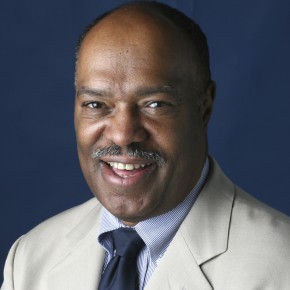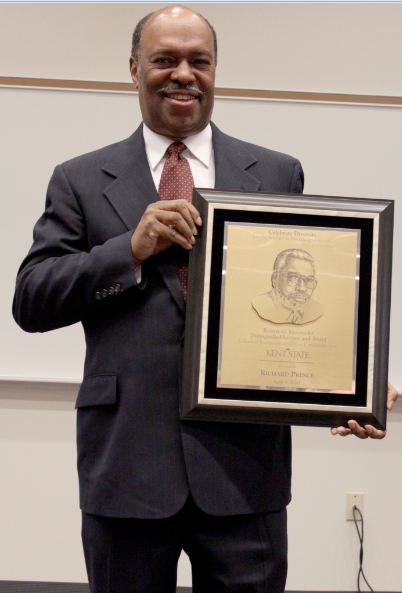By Jackie Jones, BlackAmericaWeb.com Wednesday, 09 February 2011
EDITOR’S NOTE: This “Living Legends” profile is part of BlackAmericaWeb.com’s Black History Month coverage, which will explore the lives of notable black Americans across the spectrums of politics, media, activism, business and entertainment throughout February.
Richard Prince is a firm believer in the power of journalism to make change. And it doesn’t have to necessarily be difficult.
 “Just asking the question can cause change,” said Prince, author of Journal-isms, an online column published three days a week on the Maynard Institute for Journalism Education’s website. His dispatches are widely considered must-reading for African-American journalists in particular, but for other journalists of color — and mainstream ones also.
“Just asking the question can cause change,” said Prince, author of Journal-isms, an online column published three days a week on the Maynard Institute for Journalism Education’s website. His dispatches are widely considered must-reading for African-American journalists in particular, but for other journalists of color — and mainstream ones also.
“In Congress,” Prince continued, “a committee was having a hearing (to determine) should government interfere and try to save newspapers, but they didn’t have any black folks on the panel.”
Prince recalled how he called the office of the congresswoman chairing the committee and said to an aide, “I don’t see any black people (on the list of journalists scheduled to testify). Do you intend to invite any?’ And the aide said, ‘we’ll get back to you.’ ”
Later that day, Denise Rolark Barnes, owner of The Washington Informer, a black newspaper based in Washington, D.C., had been added to the panel.
“It’s very thrilling to know you can have an impact,” Prince said.
The veteran journalist started the Journal-isms column in the 1990s while co-editor of the NABJ Journal, the monthly newsletter of the National Association of Black Journalists.
“NABJ Journal was a newspaper at that time, and the column provided an up-to-the-minute element that made people read AND talk about it,” Betty Anne Williams, a former Associated Press reporter who is now communications director for the Joint Center for Political and Economic Studies, said in an e-mail interview.
“The column was a natural extension of Richard’s journalistic personality. He would get answers to questions that inquiring minds wanted to know, and he would he get those answers before everyone else,” said Williams, who co-edited the column with Prince in its early stages. “Richard has a burning desire to let the world know what
he has found out, and that makes him something of a super sleuth. He goes to great lengths to get answers.”
“When the Internet came along,” Prince said, “Dori Maynard was looking for something to draw traffic to the Maynard Institute, and it’s gone from these little briefs to a full-blown column.”
Among mainstream journalists, a column by media critic Jim Romenesko has become a staple about the news industry. In many ways, Journal-isms serves a similar purpose, only for and about people of color.
“That’s why we started it, actually,” said Maynard, president of the journalism training institute based in Oakland, California. “I was so disturbed by Romenesko. There was never any notice of people of color.”
Maynard cited a major promotion for NBC executive Paula Madison, a black woman, that never appeared in Romenesko’s column, even though, she said, “I know people sent him the links.”
Then there was author Alisa Valdes-Rodriguez’s now-infamous 3,400-word resignation letter to The Los Angeles Times in 2001 that called the newspaper’s diversity efforts and coverage into question.
“Her resignation letter went all around and just made e-mails everywhere,” said Maynard. “It took Romenesko a month to six weeks to catch up.”
Those examples, she said, “show you how many people are being left out of the coverage. Then it turns out that the person who was critiquing the coverage was leaving out the same people.”
“(Prince’s) column began as a sort of people watch and became much more once Richard began producing it as a stand-alone item. He has claimed the whole world of what we call diversity as his beat, writing about and keeping track of developments about African-Americans, Latinos, Asian-Americans, Native Americans and the LGBT community that might otherwise go unreported,” Williams said.
The change in technology — including the explosion of blogs, viral videos, Twitter and tabloid gossip-as-news where being first is of the essence — has changed the face of journalism, and not always for the better, Prince maintains.
“The reason you become a journalist is to afflict the comfortable and comfort the afflicted,” he said, expressing concern that the motivation for today’s reporters had changed.
 “People are interested in whatever they believe will advance their careers. They don’t think there’s any career investment. Something like that is a proportion of commitment,” Prince said.
“People are interested in whatever they believe will advance their careers. They don’t think there’s any career investment. Something like that is a proportion of commitment,” Prince said.
But he doesn’t blame technology solely, as much as the reliance on it, which discourages the deep reporting that brings fresh perspectives to the news.
“In the traditional media, the stories we read aren’t always the story. We need to make sure that it’s not the same way in the new media,” Prince told an audience last April when he received the Robert G. McGruder Award at Kent State University (pictured, by Tom Jacobs), which recognizes the accomplishments of media professionals who encourage diversity in the field of journalism.
Prince’s efforts have been applauded by those called on the carpet, as well as those who benefitted from attention they might otherwise not have received.
After reading a May 2009 Journal-isms item titled “Think Twice About Using Term ‘Reverse Discrimination,’” which described how the term was being loosely — and inaccurately – thrown around, a television critic wrote to Prince: “I appreciate the info, Richard, and I’ll refrain from using that term in the future.”
“When we were producing NABJ Journal, I could not have predicted that the column would evolve into this clear and unique voice that cuts through the din of contemporary media and reminds us of how important inclusiveness is in the journalism of a free society,” Williams told BlackAmericaWeb.com.
“Richard’s column,” she said, “is helping us keep our bearings.”
Support Journal-isms
Facebook users: “Like” “Richard Prince’s Journal-isms” on Facebook.
Follow Richard Prince on Twitter @princeeditor
Richard Prince’s Journal-isms originates from Washington. It began in print before most of us knew what the internet was, and it would like to be referred to as a “column.” Any views expressed in the column are those of the person or organization quoted and not those of any other entity. Send tips, comments and concerns to Richard Prince at journal-isms-owner@yahoogroups.com
View previous columns (after Feb. 13, 2016).
- Diversity’s Greatest Hits, 2018 (Jan. 4, 2019)
- Book Notes: Is Taking a Knee Really All That? (Dec. 20, 2018)
- Book Notes: Challenging ’45’ and Proudly Telling the Story (Dec. 18, 2018)
- Book Notes: Get Down With the Legends! (Dec. 11, 2018)
- Journalist Richard Prince w/Joe Madison (Sirius XM, April 18, 2018) (podcast)
- Richard Prince (journalist) (Wikipedia entry)
- February 2018 Podcast: Richard “Dick” Prince on the need for newsroom diversity (Gabriel Greschler, Student Press Law Center, Feb. 26, 2018)
- Diversity’s Greatest Hits, 2017 — Where Will They Take Us in the Year Ahead?
- Book Notes: Best Sellers, Uncovered Treasures, Overlooked History (Dec. 19, 2017)
- An advocate for diversity in the media is still pressing for representation, (Courtland Milloy, Washington Post, Nov. 28, 2017)
- Morgan Global Journalism Review: Journal-isms Journeys On (Aug. 31, 2017)
- Diversity’s Greatest Hits, 2016
- Book Notes: 16 Writers Dish About ‘Chelle,’ the First Lady
- Book Notes: From Coretta to Barack, and in Search of the Godfather
- Journal-isms’ Richard Prince Wants Your Ideas (FishbowlDC, Feb. 26, 2016)
- “JOURNAL-ISMS” IS LATEST TO BEAR BRUNT OF INDUSTRY’S ECONOMIC WOES (Feb. 19, 2016)
- Richard Prince with Charlayne Hunter-Gault,“PBS NewsHour,” “What stagnant diversity means for America’s newsrooms” (Dec. 15, 2015)
- Book Notes: Journalists Follow Their Passions
- Book Notes: Journalists Who Rocked Their World
- Book Notes: Hands Up! Read This!
- Book Notes: New Cosby Bio Looks Like a Best-Seller
- Journo-diversity advocate turns attention to Ezra Klein project (Erik Wemple, Washington Post, March 5, 2014)
